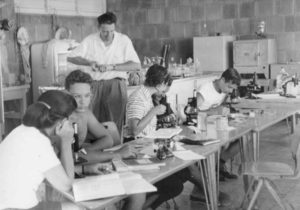One of the world’s greatest ecologists and one of Spain’s great scientists was Ramon Margalef, born May 16, 1919 (died 2004). Margalef lived through—and broadly influenced—the development of ecology into a mature and meaningful scientific discipline.
Ramon Margalef i Lopez was born in Barcelona, where he said he “lost time in Trade School and other foolishness.” As a boy, he loved to watch the life in water puddles, intrigued by the tiny organisms he saw swimming there. Over time, that interest expanded into fish and other natural organisms and places. He did not finish school, but was drafted into military service during the Spanish Civil War and later just before the start of WW2. While serving, he collected fish and wrote scientific papers.
Afterwards, he attended college at the Universitat de Barcelona, striving through individual effort to understand a broad array of subjects. He built a microscope from flea-market purchases and many devices for field observations. He learned to speak six language, nutured a love of literature, and pursued physics, but his primary attraction remained the natural history of freshwaters. He earned a BS degree in 1949 and a doctorate two years later (yes, in just two years).
He was a field biologists and ecological theoretician, noting that a good scientist should be proficient in both realms. “The good ecologist,” he said, “should be able to screw down screws with a hammer and to sink nails with a screwdriver.” He worked at the Spanish Fisheries Research Institute from 1949 to 1967. In 1967, he was appointed Spain’s first professor of ecology, at the Universitat de Barcelona, where he remained until his retirement 20 years later. He continued to work—out of a tiny office, it is said—until days before his death in 2004.

He was a prolific author, publishing more than 400 papers and numerous books. His Spanish textbook on ecology was the standard for generations. But it was a 102-page volume, published in 1968, based on a series of lectures he gave at the University of Chicago in 1966, that earned him a global reputation. The book, Perspective in Ecological Theory, presented a way to look at ecology in terms of information theory—nature was organized and operated according to the precepts of information flow. His approach fostered the analysis of the living world as a system, rather than a random assemblage of species. His theories, sometimes wrong but always creative and stimulating to other ideas, allowed the flowering of systems ecology, quantitative analysis and synthesis of field observations into meaningful patterns.
He continued his personal interest in limnology and oceanography throughout his career. He published a Spanish textbook on limnology that, like his ecology text, became a classic. Although a highly praised theoretician, he maintained that he was really “just a naturalist.” But he understood that “making lists [of species] to characterize different types of ecosystems” was an inadequate way to understand them. He consolidated the immense range of his knowledge into “a multishaped cover of life.”

On a person note, I read Perspectives in Ecological Theory when I was a doctorate student in the early 1970s and have kept it close throughout my career. Looking at my copy now, I remember my excitement at the insights it provided. It is my most annotated book. In the margin of page 41, I wrote, “It seems absolutely breathtaking that the patterns of life in the world could be theorized in this way! Fantastic.”
The rest of the world agreed with me. Ramon Margalef is one of the most honored ecologists in history, awarded the highest scientific recognition available in Spain, France, Germany, Italy, and other countries. Awards are named for him in several scientific societies, most notably the American Society of Limnology and Oceanography.
He was a humble man with a good sense of humor who excelled also at public education. He wrote several books for the general audience that remain best-sellers in Spain.
His understanding of life as a system led him to two conclusions about conservation. One, he included humans and their impacts as part of natural ecosystems, a novel idea in the 1960s and now a standard part of our approach. Second, and following the first, he understood that human use of nature was both necessary and natural—but that overuse would cause the systems to destabilize. Humans shouldn’t use all the water in rivers, for example, because “wasted water in rivers is vital to ecosystems.”
References:
Eaude, Michael. 2004. Ramon Margalef, Modest founding father of ecological science. The Guardian, 31 May 2004. Available at: https://www.theguardian.com/news/2004/jun/01/guardianobituaries.research. Accessed May 14, 2018 (note: this article contains the incorrect date of Margalef’s birth).
Peters, Francesc. 2010. Ramon Margalef, The Curiousity Driven Life of a Self-Taught Naturalist. Limnology and Oceanography Bulletin 19(1):2-14.
Ros, Joandomenec. 2004. In memory of Ramon Margalef (1919-2004). International Microbiology 7(3). Available at: http://scielo.isciii.es/scielo.php?script=sci_arttext&pid=S1139-67092004000300010&lng=en&nrm=iso&tlng=en. Accessed May 14, 2018.
